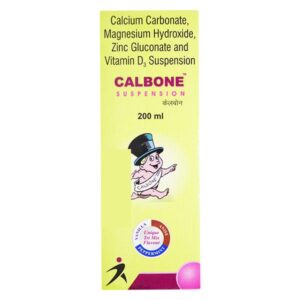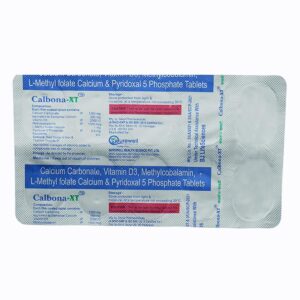CALCIUM CARBONATE + PYRIDOXINE (VITAMIN B6) + VITAMIN D + BIMATOPROST + METHYLCOBLAMIN + L-METHYLFOLATE
Calcium Carbonate: Calcium carbonate is a medication that is primarily used as a dietary supplement to provide the body with adequate amounts of calcium. It is also used as an antacid to alleviate symptoms of heartburn, indigestion, and acid reflux.
The mechanism of action of calcium carbonate as an antacid is based on its ability to neutralize excess stomach acid. When taken orally, it reacts with the hydrochloric acid in the stomach, forming calcium chloride, water, and carbon dioxide. This helps to reduce the acidity of the stomach contents and provide relief from symptoms.
As a dietary supplement, calcium carbonate helps to maintain normal bone health by providing calcium, an essential mineral for maintaining strong bones and teeth. Adequate calcium intake is important to prevent conditions like osteoporosis and brittle bones.
The recommended dose of calcium carbonate depends on the specific use. As a dietary supplement, the usual recommended dose is 500-1500 mg per day, typically divided into two or three doses. As an antacid, the dose varies depending on the severity of symptoms but is usually 500-2000 mg as needed. It is important to follow the instructions provided by your healthcare provider or read the product label for the appropriate dose.
Common side effects of calcium carbonate include constipation, flatulence, belching, and stomach discomfort. These side effects are usually mild and temporary. In some cases, high doses of calcium carbonate can lead to hypercalcemia (high levels of calcium in the blood), which can result in symptoms like nausea, vomiting, increased thirst, increased urination, and confusion. If any adverse effects occur, it is important to consult a healthcare professional for further guidance. It is also worth noting that calcium carbonate may interact with certain medications, so it is important to inform your healthcare provider about all the medications you are taking before starting calcium supplementation.
Pyridoxine (vitamin B6): Pyridoxine, also known as vitamin B6, is a water-soluble vitamin essential for various metabolic processes in the body. It is primarily used as a dietary supplement to treat vitamin B6 deficiency or prevent it in individuals at risk.
Pyridoxine plays a crucial role in the metabolism of amino acids, carbohydrates, and lipids. It is involved in the synthesis of neurotransmitters such as serotonin, dopamine, and gamma-aminobutyric acid (GABA). Additionally, it plays a role in the formation of hemoglobin and helps maintain a healthy immune system.
The recommended daily dose of pyridoxine varies depending on factors such as age, gender, and pregnancy status. For adults, the recommended dietary allowance (RDA) ranges from 1.3 to 2 mg per day. However, higher doses may be prescribed by healthcare professionals for specific medical conditions.
While pyridoxine is generally safe, high doses can lead to side effects. The most common side effects include nausea, headache, drowsiness, tingling of the skin, and numbness of the extremities. Long-term use of extremely high doses of pyridoxine can cause nerve damage, known as sensory neuropathy. Therefore, it is important to follow the recommended doses and consult a healthcare professional before starting any supplementation.
Pyridoxine is commonly found in various foods such as meats, fish, poultry, eggs, legumes, nuts, and whole grains. In cases of deficiency or when dietary intake is inadequate, pyridoxine supplements may be recommended to ensure optimal intake and prevent associated health issues.
It is important to note that pyridoxine should not be used as a substitute for a balanced diet and is generally recommended to be consumed as part of a healthy and varied diet. Always consult with a healthcare professional before starting any supplementation.
Vitamin D: Vitamin D is a fat-soluble vitamin that plays a crucial role in the absorption of calcium and phosphorus in the body. It is primarily obtained through sun exposure and can also be obtained through dietary sources such as fatty fish, fortified dairy products, and certain mushrooms.
Use:
Vitamin D is used to prevent or treat vitamin D deficiency. It is commonly prescribed for individuals who have limited sun exposure, darker skin tones, or conditions that impair vitamin D absorption, such as liver disease or inflammatory bowel disease. It is also used to treat certain bone disorders like rickets and osteoporosis.
Mechanism of Action:
When the skin is exposed to sunlight, it produces a precursor called 7-dehydrocholesterol, which is then converted to vitamin D3 or cholecalciferol. Vitamin D3 is further metabolized in the liver and kidneys to its active form, calcitriol. Calcitriol works by binding to vitamin D receptors in various organs, including the intestines, bones, and kidneys, thereby promoting calcium and phosphorus absorption and maintaining their optimal levels in the body.
Dose:
The recommended daily intake of vitamin D varies depending on age, sex, and health condition. In general, the adequate intake for adults is 600-800 international units (IU) per day, with higher doses recommended for individuals at risk of deficiency. For therapeutic purposes, the prescribed dose may range from 1,000 to 10,000 IU per day, depending on the severity of the deficiency.
Side Effects:
Vitamin D is generally safe when taken within the recommended dosage range. However, excessive intake of vitamin D can lead to toxicity known as hypervitaminosis D. Symptoms of vitamin D toxicity include nausea, vomiting, poor appetite, constipation, weakness, and high levels of calcium in the blood (hypercalcemia), which can cause symptoms like frequent urination, excessive thirst, and confusion. It is important to monitor vitamin D levels regularly and consult a healthcare professional for appropriate dosage guidance. Additionally, vitamin D supplements may interact with certain medications, so it is important to inform your healthcare provider about all the medications you are taking.
Bimatoprost: Bimatoprost is a medication used primarily for the treatment of glaucoma and ocular hypertension. It is available in the form of eye drops and belongs to a class of drugs called prostaglandin analogs.
The primary mechanism of action of bimatoprost is to reduce intraocular pressure (IOP) by increasing the outflow of aqueous humor from the eye. It works by mimicking the prostaglandin F2-alpha hormone, which helps to reduce IOP by increasing the drainage of fluid from the eye and decreasing its production.
For the treatment of glaucoma and ocular hypertension, bimatoprost eye drops are typically used once daily, usually in the evening. The exact dosage and duration of treatment should be determined by a healthcare professional and may vary depending on the patient’s condition.
Like any medication, bimatoprost is associated with potential side effects. Common side effects may include blurred vision, eye redness or irritation, eye itching or stinging, darkening of the iris, changes in eyelash growth, and dry eyes. These side effects are usually mild and temporary.
Less common but more severe side effects may include eye pain, sensitivity to light, swollen or infected eyelids, inflammation of the eye, and changes in vision. If any of these side effects occur or persist, it is important to seek medical attention.
It is crucial to inform a healthcare professional about any pre-existing medical conditions, ongoing medications, and allergies before using bimatoprost. Pregnant or breastfeeding women should consult their healthcare provider before starting bimatoprost treatment.
Overall, bimatoprost is an effective medication for managing glaucoma and ocular hypertension. However, it is essential to follow the prescribed dosage and seek medical advice if any concerning side effects occur.
Methylcoblamin: Methylcobalamin is a form of vitamin B12 that is commonly used as a supplement or medication. It is an active form of vitamin B12 and plays a crucial role in various bodily functions, including nerve function, DNA synthesis, and red blood cell production.
Methylcobalamin is primarily used in the treatment of vitamin B12 deficiency, which can occur due to various factors like inadequate dietary intake, malabsorption, pernicious anemia, or certain medical conditions. It is also prescribed in certain cases of nerve damage or neuropathy, as it helps in nerve regeneration and repair.
The mechanism of action of methylcobalamin involves its conversion to coenzyme forms, which play essential roles in various biochemical reactions in the body. One of the key functions is its involvement in the methylation process, which is essential for DNA synthesis and nerve function. Methylcobalamin helps in the conversion of homocysteine to methionine, which regulates the production of myelin, the protective sheath around nerves. By improving methylation and myelination, it helps in the maintenance and repair of nerves.
The dosage of methylcobalamin depends on the individual’s specific condition and the severity of vitamin B12 deficiency. In general, the recommended dose for adults is usually between 1000 to 5000 micrograms per day, orally or through intramuscular injection. The duration of treatment varies depending on the underlying cause of deficiency or the specific condition being treated.
Methylcobalamin is generally well-tolerated, and side effects are minimal. However, some individuals may experience mild side effects such as nausea, vomiting, headache, diarrhea, or skin rash. These side effects are usually temporary and resolve on their own. In rare cases, allergic reactions may occur, which require immediate medical attention.
It is important to note that methylcobalamin supplements should be taken under the guidance of a healthcare professional, as they may interact with certain medications and may not be suitable for individuals with certain medical conditions, such as Leber’s disease.
Overall, methylcobalamin is a vital nutrient that is commonly used to treat vitamin B12 deficiency and nerve damage. It helps in maintaining healthy nerve function, DNA synthesis, and red blood cell production. As with any medication, it is important to follow the recommended dosage and consult a healthcare professional for personalized advice.
L-Methylfolate: L-Methylfolate is a form of folate, which is a B-vitamin essential for various bodily functions, including the production of DNA, RNA, and certain neurotransmitters. It is primarily used as a dietary supplement and prescription medication to treat folate deficiency and certain mental health conditions.
The mechanism of action of L-Methylfolate involves its conversion into L-5-Methyltetrahydrofolate (5-MTHF), the active form of folate in the body. 5-MTHF plays a crucial role in the synthesis of neurotransmitters such as serotonin, norepinephrine, and dopamine, which are responsible for regulating mood, cognition, and sleep. By providing a bioavailable form of folate, L-Methylfolate helps ensure optimal neurotransmitter function.
The recommended dose of L-Methylfolate varies depending on the condition being treated. For folate deficiency, the typical dose is 1-2.5 mg per day. For mental health conditions such as depression, schizophrenia, or bipolar disorder, higher doses ranging from 7.5-15 mg per day may be prescribed. It is important to follow the instructions provided by a healthcare professional regarding the appropriate dosage.
L-Methylfolate is generally considered safe and well-tolerated. However, like any medication, it may have some side effects. Common side effects include gastrointestinal disturbances such as nausea, vomiting, and abdominal pain. Some individuals may also experience headaches, sleep disturbances, irritability, or mild allergic reactions.
People with certain medical conditions or taking certain medications may be at a higher risk of experiencing side effects or drug interactions. It is important to consult with a healthcare professional before starting L-Methylfolate to ensure its safe use, particularly if you have a history of epilepsy, seizure disorders, or are taking antiepileptic medications.
In summary, L-Methylfolate is a form of folate used as a dietary supplement and prescription medication to treat folate deficiencies and certain mental health conditions. It works by providing a bioavailable folate source that is essential for neurotransmitter synthesis. The dosage and potential side effects should be discussed with a healthcare professional before initiating treatment.



